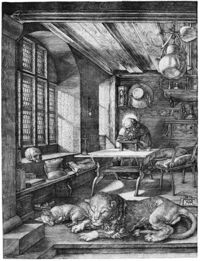Difference between revisions of "Uniqueness"
Kevin Wang (talk | contribs) (Created page with "{{Studying}} <onlyinclude> '''Uniqueness''' is the property of a clue or series of clues which points to exactly one answer. The selection and proper rendering of uniq...") |
Kevin Wang (talk | contribs) (incorporate text from Uniquely identifying) |
||
| Line 1: | Line 1: | ||
{{Studying}} | {{Studying}} | ||
<onlyinclude> | <onlyinclude> | ||
| − | '''Uniqueness''' is | + | '''Uniqueness''' is a property of a [[clue]] or series of clues that refers to exactly one potential action; such a clue is then '''uniquely identifying'''. The selection and proper rendering of unique clues is an important step of the [[writing]] process. |
| − | + | Other [[trivia]] events sometimes refer to this property as '''"pinned"''', or refer to adding information that makes an otherwise non-unique clue unique as adding "the '''pin'''"; that may be because those were the terms of art among writers for [[game show]]s such as ''Who Wants To Be A Millionaire?'' as recently as the mid-2000s.[https://books.google.com/books?id=tXi_rfgUWCcC&pg=PT113] | |
</onlyinclude> | </onlyinclude> | ||
==Theory== | ==Theory== | ||
| − | Uniqueness is an important aspect of [[pyramidality]] - in order to distinguish players based on their relative level of knowledge, it must be possible to provide the correct answer at various points in the question. | + | Uniqueness is an important aspect of [[pyramidality]] - in order to distinguish players based on their relative level of knowledge, it must be possible to provide the correct answer at various points in the question. |
| − | It is not required (or even possible, in most cases) for every single word or clause of a tossup or clue to be unique. Nevertheless, | + | It is not required (or even possible, in most cases) for every single word or clause of a tossup or clue to be unique. Nevertheless, every sentence in a [[good quizbowl|good]] [[tossup]] should contain at least one uniquely identifying clause, and all such clauses will be about the actual answer to the tossup. There is more flexibility to use non-unique sentences in [[bonus]] parts, but each bonus part should contain at least one uniquely identifying clue. |
Consider the following [[leadin]] from a question on {{q|{{bu|Amaterasu}}}}: | Consider the following [[leadin]] from a question on {{q|{{bu|Amaterasu}}}}: | ||
Latest revision as of 20:48, 1 August 2023
Concepts
Guides
Uniqueness is a property of a clue or series of clues that refers to exactly one potential action; such a clue is then uniquely identifying. The selection and proper rendering of unique clues is an important step of the writing process.
Other trivia events sometimes refer to this property as "pinned", or refer to adding information that makes an otherwise non-unique clue unique as adding "the pin"; that may be because those were the terms of art among writers for game shows such as Who Wants To Be A Millionaire? as recently as the mid-2000s.[1]
Theory
Uniqueness is an important aspect of pyramidality - in order to distinguish players based on their relative level of knowledge, it must be possible to provide the correct answer at various points in the question.
It is not required (or even possible, in most cases) for every single word or clause of a tossup or clue to be unique. Nevertheless, every sentence in a good tossup should contain at least one uniquely identifying clause, and all such clauses will be about the actual answer to the tossup. There is more flexibility to use non-unique sentences in bonus parts, but each bonus part should contain at least one uniquely identifying clue.
Consider the following leadin from a question on Amaterasu
:
This deity won a challenge with another god by creating three goddesses by chewing up a sword and spitting it out, after which her opponent went on a rampage.
-2019 Glasgow Scottie
A psychopath particularly bold individual could buzz after the word "deity" and give an answer like Ares
then attempt to protest their way into points on the argument that the answer they provided was accurate given the clues that had been read thus far. To avoid this edge case, both ACF and NAQT have clues that limit protests on the grounds of uniqueness to after the first clue. This has had its own negative consequences, namely that it is difficult for a player to discern where the first clue ends (and thus when they are allowed to protest).
A hose is a particular form of "bad quizbowl" in which this basic principle has been upended and players who buzz on early clues are negged because the clues were accidentally or intentionally non-unique.
